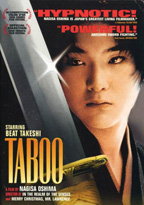TABOO (Gohatto)
(director/writer: Nagisa Oshima; screenwriter: based on two short stories by Ryotaro Shiba; cinematographer: Toyomichi Kurita; editor: Tomoyo Oshima; cast: Beat Takeshi Kitano (Lt. Commander Toshizo Hijikata), Tadanobu Asano (Samurai Hyozo Tashiro), Koji Matoba (Samurai Heibei Sugano), Ryuhei Matsuda (Kano), Yoichi Sai (Commander Isami Kondo), Jiro Sakagami (Lt. Genzaburo), Shinji Takeda (Lt. Okita), Kei Sato (Narrator), Tomorowo Taguchi (Samurai Tojiro Yuzawa); Runtime: 101; New Yorker Release; 2000-Japan/France/UK)
“A brilliantly stylized period piece set in Kyoto.”
Reviewed by Dennis Schwartz
A brilliantly stylized period piece set in Kyoto in 1865, during the final days of the samurais. It’s written and directed by the great Japanese filmmaker Nagisa Oshima (In the Realm of the Senses/Empire of Passion/Merry Christmas, Mr. Lawrence). This is the 69-year-old filmmaker’s first feature in 14 years and the first since the 1995 minor stroke which left him part-paralyzed on his right side. He directed this powerful film from a wheelchair. It explores homosexuality in the ranks of the military. It also relates to the affects of uncontrollable passion with death, as it further explores how jealousy among men lovers can be deadly.
Taboo has a dreamlike quality that sets an eerie bluish mood and makes the characters glow with a haunting feeling of the afterworld. Its tale is focused on a new recruit to the Shinsen militia, who seeks to become a samurai warrior. He’s an effeminate and beautiful 18-year-old, a rich merchant’s son named Sozaburo Kano (Ryuhei Matsuda). The militia he joins puts down insurrections, maintains order among the clans, and protects the shogun. At the same time he joins, another recruit — Hyozo Tashiro (Tadanobu Asano) — a commoner, who also becomes a samurai. They are selected by Commander Isami Kondo (Yoichi Sai) and his Lieutenant Commander, Captain Toshizo Hijikata (Takeshi Kitano). Kano is very appealing because of his boyish locks of hair and sensual and regal mannerisms, and his great ability as a warrior; his stunning looks attract everyone’s attention. In history, the Shinsen militia was renown for its ruthless code of conduct, its violent use of force, and its open homosexuality.
The plot revolves around the lust among the men when Kano joins them in the barracks. The first to have a whack at him is Tashiro, who cuddles up in their sleeping quarters and gets him from behind as Kano passively says nothing but appears to not be stimulated by the rape. Later Kano rebuffs his advances to be lovers. Kano’s superiors, Kondo and Hijikata, take an obsessive interest and act concerned that there is a jealousy among the men over him, thinking this will spoil the militia’s unity (the modern U.S. Army might have the same homosexual dilemma in mind when they initiated their policy of: ‘Don’t ask, don’t tell’).
To test Kano’s courage, the new recruit is ordered to carry out a beheading of a fellow samurai who broke the strict rules of conduct. Kano executes him without any hesitation and with an efficiency that greatly pleases his superiors. Later he is ordered to kill Tashiro, whom his superiors suspect of being his lover and of being overly jealous that Kano is seeing other men. Kano does that assignment without one peep of protest. The superiors further connive to find ways to deal with this untenable situation. Hijikata orders a sergeant to get Kano a geisha girl. But Kano refuses to sleep with her, saying he prefers the sergeant. The filmmaker concocts a bitter story about a possessed young man who joined the militia so he can kill freely to exorcize his demons. Kano’s now faced with resolving what he narcissistic-ally has attracted through his flirtatious demeanor.
The film is ambiguous, shrouded in veils of forbidden sexual lore. Its look at homosexuality is also a look at how others look at it. It examines the violence that goes with an illegal gay sex. The most mysterious scene comes at the end, when Takeshi Kitano’s anguished face is portrayed in a long close-up (even though he’s supposedly a heterosexual, he’s the most jealous of Kano). We follow Kitano’s emotional thrusts as he angrily cuts down with his sword a cherry tree in bloom. This action infers a secret feeling between Kano and himself.
The film ends without clarity as to what Kano or the commanders were going through internally. “Taboo” works best as a lyrical drama. It seems to connect the beauty of Kano with an inherent evil he possesses to draw those to him who are willing to die for their desires. This is a thoroughly maddening intellectual work from arguably Japan’s best living director.

REVIEWED ON 7/11/2001 GRADE: A – https://dennisschwartzreviews.com/